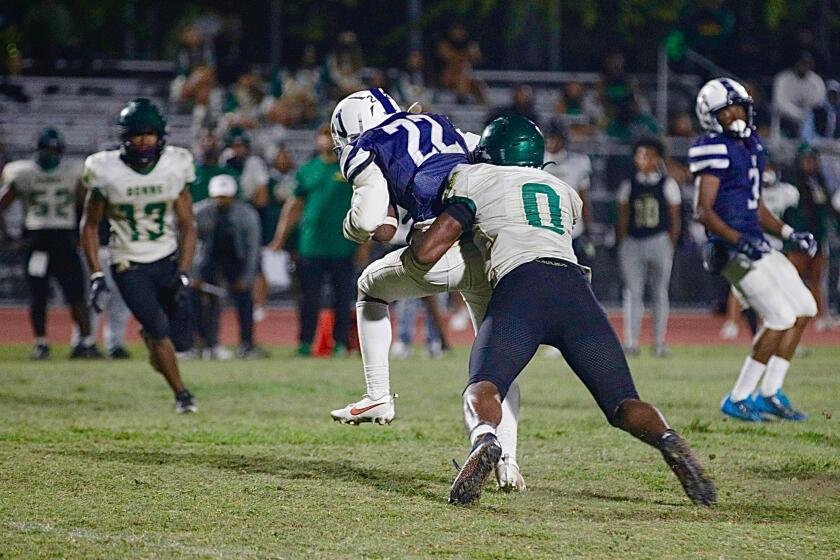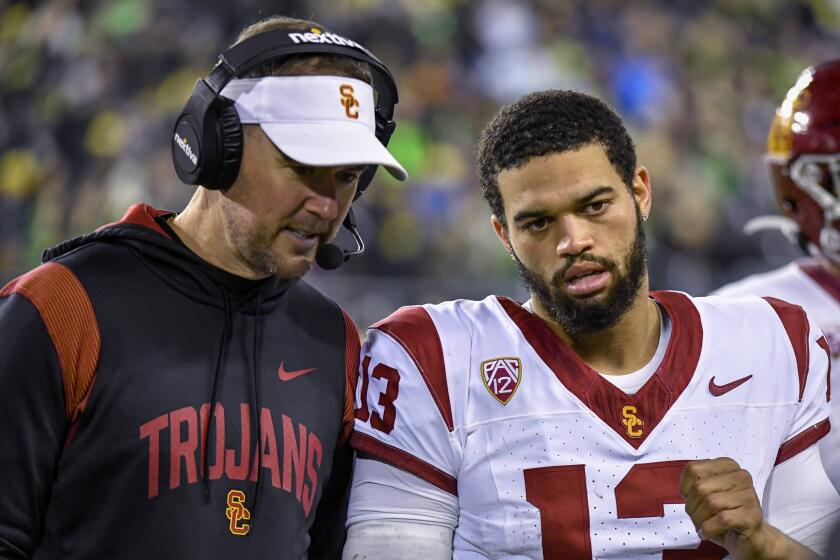Boxer, Club Survive Near KO by Gunman : Oxnard: Near fatal shooting of Ruben Juarez also sent a boxing program reeling. But nearly a year later both are recovering.
When an assailant shot Ruben Juarez in the stomach last July, the gunman also delivered a near fatal blow to the boxing program at Venturaâs Westpark Recreation Center.
Juarez--a 22-year-old reformed gang member--coaches the program and serves as a role model for its 50 or so young participants.
He was shot outside a convenience store in Ventura after an argument with Oxnard gang members, police said. During his recuperation, many of the young fighters lost interest in boxing. Their attendance at the club fell off and many had doubts whether their coach would live, officials said.
Since the shooting, however, Juarez and the boxing club have made nearly full recoveries.
And after a long investigation, authorities were able to get an indictment last month against the alleged gang member accused of shooting Juarez. Pedro Valadez, 25, of Oxnard has been charged with assault with a deadly weapon. His arraignment Wednesday was continued until July 13.
The shooting shed light on the efforts of Juarez and others at the Westpark Recreation Center to keep young people off the streets and out of trouble through boxing programs boxing and other events.
Juarez was hired to coach boxing at the club after he nearly made the U. S. Olympics team in 1992. Before, he had spent a lot of time on the streets himself.
It started when he was 13, after the boxing club at the center had closed.
âOnce the boxing club shut down, I hit the streets, got a girlfriend, wrote (graffiti) on walls, got tattoos and started hanging on the Avenue,â the soft-spoken Juarez recalled.
His quest to hang out with older boys often landed him in and out of juvenile hall.
They got into trouble, especially after hanging out at teen-age night clubs on Main Street.
âOn the way home, weâd come down the streets and knock over trash cans, turn over bus benches. It was just something to do,â Juarez said.
In the 10th grade, he dropped out of Ventura High School and soon fathered a son. When he was 18, he was arrested for stealing a car, something he had done numerous times before.
âI got caught by a cop who I almost hit in the alley in the projects,â Juarez said. âThe guys who were with me, they split, just left.â
*
Juarez said he decided to change his life while in jail.
âI was just sitting in my cell, thinking that I still wanted to go to the Olympics. But I knew I couldnât get a gold medal by sitting there. So I just gave it up.â
He lifted weights and started running until he regained his form. âLittle by little, I started getting back into it,â he said of boxing.
Eventually, Juarez entered some amateur fights in Los Angeles and across Southern California in the 125-pound division. He kept winning, but never thought much of it. He gained confidence by training with some professional boxers who would come to Oxnard.
âBy training with the pros, I felt I could win some tournaments,â Juarez said. âI started winning tournaments in Los Angeles. It was no big deal to me. Back at home, I had hundreds of trophies in my garage.â
In 1992, the American Boxing Federation asked Juarez to compete for a spot on that yearâs Olympics team. At the Olympics Training Center in Lake Placid, N.Y., he won all three matches and moved closer to his dream of earning a spot on the team.
At another Olympics tournament in Los Angeles, he won two more fights. Finally, he was pitted against a young hotshot from Los Angeles, 17-year-old Oscar de la Hoya--now the World Boxing Organizationâs lightweight champion.
The two fought for three rounds, toe-to-toe; De la Hoya won on points. Juarez was crushed. He and his manager split.
*
Juarez went on to sign a professional contract, but nothing much ever came of it. He said his manager did not get him any fights, and he just wound up working construction for the man. That lasted two years--before he got a call to start coaching at the Westpark center.
âRuben was like a little local celebrity because he had gone to the Pan Am games and almost made the Olympics,â said Roberta Payan, the Westpark program coordinator who brought Juarez in in a volunteer capacity.
Before Juarez took over, the club was foundering. Under Juarez, it is one of the fastest-growing boxing clubs in the state.
But then he was shot in front of the Stop âNâ Go Market at 1007 E. Main St. during the early morning of July 24 last year. It happened after Juarez and some friends got into an argument with Valadez and three other alleged Oxnard gang members, police said.
The shooting caused interest in the boxing program to nose-dive. But Juarez returned several months later.
âHe never once discussed it with the kids,â Payan said. âHe just said he was sick.â
But the story hit the local media, and many of the youngsters stopped coming to the recreation center. Juarez speculated that their parents probably thought the center was not safe, even though the shooting happened off the premises.
âIt went dead around here,â said Juarez, who lost a portion of his stomach to the bullet and now can digest only one small meal at a time. âEverybody stopped coming. They thought I was going to be gone.â
âThey missed Ruben,â Payan said of the young boxers. âThey figured since he wasnât there we werenât going to continue the program. We tried to keep it going. But Ruben is the biggest motivator to keep it going.â
*
Now that Juarez has returned, however, boxing is again the biggest program at the center, which also offers classes in ceramics, poetry, music, as well as other sports, including basketball.
Standing inside the boxing clubâs weight room, Juarez pointed to some photos. They are of his childhood friends, all ex-boxers.
âThis guy here, heâs in prison for life,â he said. âThis guy here, heâs gettinâ in and out of trouble. This guy here, he hit the streets. I donât know why. He said boxing is boring.
âI donât want these kids experiencing what I did in the streets,â Juarez said of his proteges. Under Juarezâs direction, many of the students have traveled throughout the state and beyond to participate in--and often win--boxing tournaments.
âIt keeps you out of trouble,â said Omar Uribe, 13, of El Rio, who also dreams of going to the Olympics.
âItâs a lot of fun,â added 8-year-old Daniel Cervantes of Ventura. âYou can win a belt and a lot of trophies.â
These youths also learn how to avoid a fight.
âIt teaches you self-defense outside the ring,â said 10-year-old Ruben Luna, an 85-pounder. âBut you canât use it unless youâre in real danger.â
More to Read
Go beyond the scoreboard
Get the latest on L.A.'s teams in the daily Sports Report newsletter.
You may occasionally receive promotional content from the Los Angeles Times.










